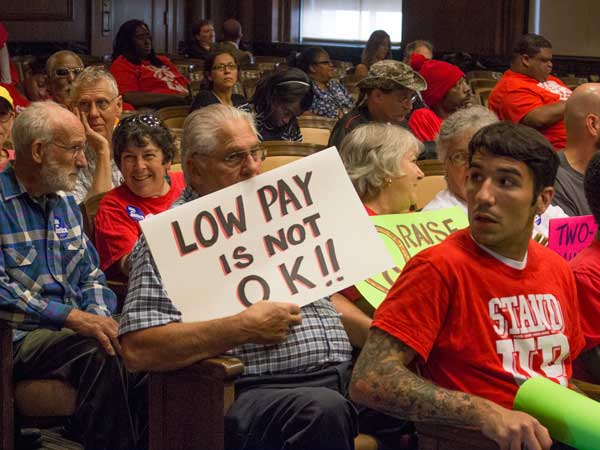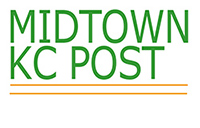 The city council today introduced and advanced a new minimum wage proposal for an increase to $13 an hour by 2023.
The city council today introduced and advanced a new minimum wage proposal for an increase to $13 an hour by 2023.
Acting as a committee of the whole, all the councilmembers sent it to themselves for a final vote next Thursday.
The substitute ordinance replaces one filed by Councilman Jermaine Reed that called for an increase to $15 an hour by 2020.
Reed today voted with all council members to advance the $13 substitute.
The first increase would be from the state level of $7.65 an hour to $8.50 on Aug. 24 and it would increase some each year until 2023. It then would top out at $13 an hour with any more increases based on the regional consumer price index.
Neither advocates for business nor those for the poor got all they wanted as defined by their six weeks of meetings.
Advocates for the poor supported Reed’s ordinance for $15 an hour by 2020, and waged a successful petition drive that could force a vote on that.
Businesses wanted an increase to no more than $9 over at least two years. And they did not want any wage increase to apply to workers of age 26 or younger. Today’s ordinance would exempt workers 18 or younger.
Also exempted: Immediate family members of the employer, interns, apprentices, those working in court-ordered community service, government employees except city workers, and volunteers to educational, charitable, religious or nonprofit organizations.
The minimum wage for tipped employees would be 50 percent of the state minimum wage.
The higher wage also would apply only to employers with more than 15 employees and gross annual revenue of more than $500,000.
Violations would be punished by up to a $1,000 municipal court fine.
Councilman Ed Ford questioned how the city would enforce the law. Mayor Sly James said that is still being worked out here and in other cities that have done increases.
James said Seattle, which is on route to a $17.25 minimum wage by 2024, is already bogged down in enforcement cases.
Two experts testified that Kansas City should raise the minimum wage, but not too much. Experts also said the city is on the cutting edge of a social experiment in which cities raise the minimum wage.
“We have no idea where this ends,” James said. “Nobody in the country does.”
Steve Lebofsky, a city planner, reported on the minimum wage issue locally and nationwide. His conclusion: “In order to get one that works for Kansas City, you should keep it modest but there definitely should be one.”
He also reported that Kansas City has 50,640 workers earning less that the current minimum wage and 92,040 workers making less than $13 an hour.
Ford, a lawyer, questioned if it would be better for legal reasons to just raise the wage once much higher than $8.50 on Aug. 24.
That is because city lawyers at first determined the city could not legally raise the wage but changed that after the Missouri legislature created a window by passing a bill – still unsigned by the governor – that clearly forbids cities from raising the wage it but allows it for such laws passed before that bill would go into effect on Aug. 28.
But the governor could veto the bill so it never goes into effect. Whatever, James said, a court will end up deciding if any Kansas City wage hike stands.
But raising the wage too much this year would bankrupt too many businesses that have already set their budgets, James said, and the city should not base its wage increases on legal speculation.
“We’re shooting in the dark,” he said.



Who’s talking